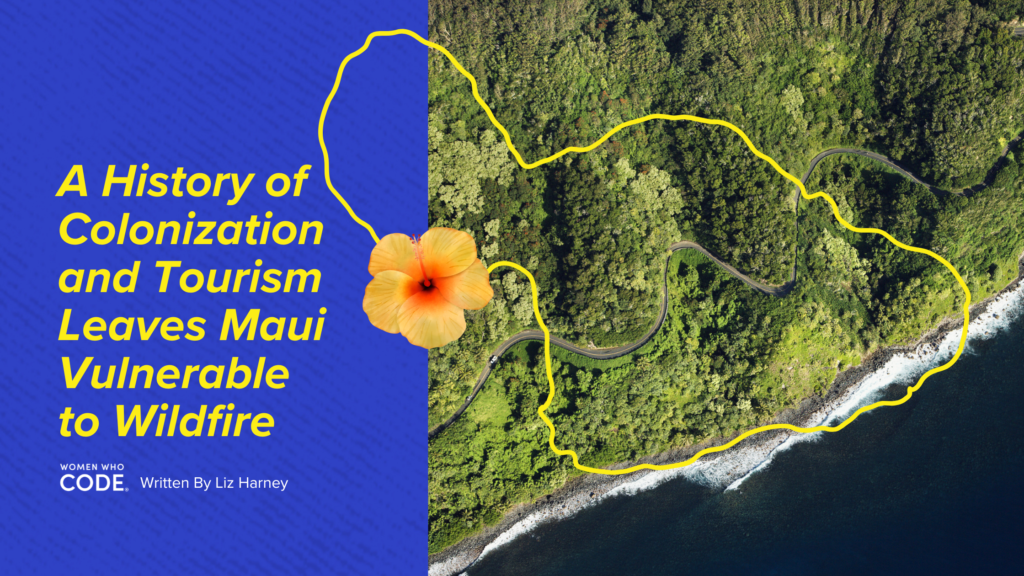A History of Colonization and Tourism Leaves Maui Vulnerable to Wildfire
Written by Liz Harney

On Tuesday, August 8, the deadliest U.S. wildfires in the last century swept through Lahaina, Maui, significantly impacting the local community and native ecosystems. Over 100 people have died, with thousands still missing. Experts believe the wildfires were caused by high temperatures, drought, and dangerous winds from Hurricane Dora, a Category 4 storm nearby. However, a history of colonization, the oppression of the Kānaka Maoli people, privatization of ancestral lands, and development of the Maui tourism industry also play a significant role.
In the late 19th century, colonial powers, including the United States, exerted control over Maui, bringing Western land practices that often conflicted with traditional indigenous land management systems. Colonial policies favored resource extraction and economic interest over the well-being of native Hawaiians and ecosystems. For example, the sugar cane mono-crop agricultural boom was born out of this mentality, the practice of growing a single crop year after year on the same land, leaving soil depleted of nutrients and susceptible to erosion. Invasive plants such as guinea grass were also introduced to Hawaii during this time, impacting native vegetation. When guinea grass catches fire, it burns into native plant life, destroying ecosystems.
It’s no secret that Maui’s tourism industry is vast, making up about 80% of its wealth. As more tourists flock to this island, hotels and the cost of living continue to climb, pushing out native Hawaiians to make room for wealthy travelers, in many cases, encroaching upon or paving over ancestrally significant land. Tourists have continued visiting the island on vacation as the Kānaka Maoli mourn the loss of their homes, neighbors, friends, and ancestral artifacts that told the stories of their culture and lineage predating colonization.

According to the BBC, one Maui resident stated, “Tourists swim in the water we died in,” highlighting the disparity between the native people and the tourism culture in Maui. Hotels should be available to those who have lost everything, yet vacationers continue to rent rooms. Right now, the Lahaina people need safe drinking water, food, and access to shelter.
As the impact of climate change worsens, natural disasters will become more severe, and statistically, underrepresented people are the most impacted by these environmental catastrophes. “The disturbing silence left by the missing and the mourned souls tells of a disaster that’s unnatural, shaped by the human hand—a byproduct of the dangerous dance between climate change and centuries of colonial greed,” says Kaniela Ing, native Hawaiian and National Director of the Green New Deal Network.
Hawaii and the Kānaka Maoli people need our support with their call to halt tourism to Maui and bring awareness to the impact of colonization, climate change, and damage to the local ecosystems that has left the community vulnerable to environmental disasters.
You can help the Lahaina community now by:
- Canceling travel to Maui and urging others to do the same.
- Assisting in helping families find their missing loved one(s).
- Enlisting the help of your community to spread the word about the Maui wildfires and their impact on the Kānaka Maoli people.
Learn More:
- Hawaii’s Endangered Plant Species Face a Long Road to Recovery After Wildfires — ABC News
- How Can Climate Change Affect Natural Disasters? — USGS.gov
- The Climate Crisis and Colonialism Destroyed My Maui Home. Where We Must Go From Here — Time.com
- Fires in Maui: ‘Tourists swim in the waters we died in” – BBC